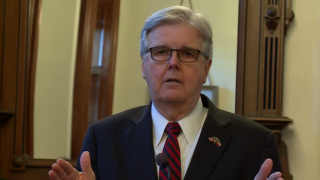
What to Know
- Lt. Gov. calls for special session to pass three "conservative bills."
- Gov. Abbott must order the special session and he can call as many special sessions as he wants, each lasting no more than 30 days.
- During a special session, legislators can only consider bills on the governor's agenda.
Texas Lt. Gov. Dan Patrick (R) is asking Gov. Greg Abbott (R) to call a special legislative session to pass three conservative bills that died in the House Tuesday night when they failed to pass before a critical deadline.
Patrick tweeted Wednesday morning that he was asking the governor to convene the June special session to pass SB 29, SB10 and SB12, all bills Patrick said were killed by the Texas House and were "conservative bills that majority of Texans in both parties support."
Abbott has not yet announced a special session or publicly responded to Patrick's request, but he did tweet that there was still time for both chambers "to work together to get important conservative legislation to my desk."
Get top local stories in DFW delivered to you every morning. >Sign up for NBC DFW's News Headlines newsletter.
The Dallas Morning News reports a special session would cost taxpayers about $1 million.
Details about the three bills targeted by the lieutenant governor are below:
SB29
Relating to requiring public school students to compete in interscholastic athletic competitions based on sex and a study conducted by the University Interscholastic League on the effects of allowing a student to participate in an athletic competition designated for the sex opposite to the student's sex.
Texas News
News from around the state of Texas.
The Texas Tribune reported the House ran out of time to consider the bill Tuesday night after hitting the deadline for passing all Senate bills. SB29 mandates transgender athletes play on teams based on their sex assigned a birth instead of the sex that matches their gender identity. Supporters say the bill protects girls' sports and doesn't give transgender athletes an unfair advantage while opponents say the legislation is discriminatory.
SB10
Relating to certain requirements applicable to political subdivisions and other entities that engage in lobbying and to the applicability of lobbyist registration requirements to a person who provides legal services to a political subdivision.
Our partners at The Dallas Morning News reported "SB 10 began as an outright ban on taxpayer-funded lobbying by Texas cities and counties. As rewritten and advanced by House State Affairs on Friday, it would make all the local government entities, including school and hospital districts, publish a notice when they plan to hire a lobbyist. The governing body then would have to vote to do so."
SB12
Relating to complaint procedures and disclosure requirements for social media platforms and to the censorship of users' expressions by an interactive computer service.
Abbott said in March he supported SB12 as a way for conservative voices to be guaranteed a voice and not silenced by "big tech media censorship. "
"Social media sites have become our modern-day public squares where information should be able to flow freely, but social media companies are now acting as judge and jury on determining what viewpoints are valid,” said Abbott in a statement in March. “America was built on freedom of speech and healthy public debate, and efforts to silence conservative viewpoints on social media are wrong and weaken public discourse. I thank Senator Hughes for offering SB 12 to help protect Texans from being wrongfully censored on social media for voicing their political or religious viewpoints. With SB 12, Senator Hughes is taking a stand against Big Tech’s political censorship and protecting Texans’ right to freedom of expression. I look forward to working with Senator Hughes to sign this bill into law and protect free speech in Texas."



